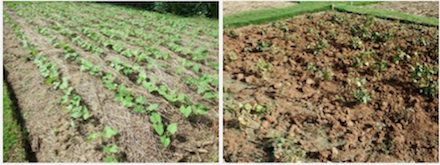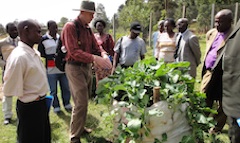|
|
|
|
 |
|
Farming God's Way
Agriculture is in crisis throughout Africa with soil erosion rising, crop yields falling and erratic rains due to climate change leaving farmers confused and despairing.
Now a new form of agriculture – Farming God’s Way – based on Christian teachings is transforming agriculture across Christian communities in Africa, bringing glory to God and hope to the hungry: its natural methods are leading to increasing crop yields – sometimes significantly, by three, five or even ten times.
ARC is helping the movement and knowledge to spread.
What is Farming God’s Way?
A group of men and women are gathered in a field in Kenya in October 2012, excitedly chatting as they measure distances using lengths of string. Following the measurers are others digging small holes at very precise angles and applying specific amounts of fertiliser and seed. There’s a lot of laughter and animated talk, but also focus and concentration.
These pastors and church leaders from the Anglican and Catholic churches in Kenya are learning a new form of agriculture called Farming God’s Way, which is not only helping to restore degraded land and protect the environment, but
The three-day training, run by Craig Sorley of Care of Creation Kenya, is the second of two workshops organised by ARC for Christian faith leaders. As well as Anglicans and Catholics, representatives of the Methodist Church in Kenya and the Presbyterian Church of East Africa have also been trained.
The aim is to create a network of Farming God’s Way champions who will spread this sustainable farming method to their congregations throughout Kenya, and beyond – transforming agriculture across Africa and, in the words of Craig Sorley, bringing glory to God and hope to the hungry.
 |
 |
 |
On the left are mulched fields, as taught in Farming God's Way; on the right the weaker plants are not mulched |
Why is it needed?
Agriculture is the backbone of sub-Saharan Africa, providing the biggest source of employment, livelihoods and foreign exchange. Yet soils are worn out and agricultural production is falling. Per capita agricultural production fell by about 5% over the past 20 years in sub-Saharan Africa while increasing by 40% in other developing regions.
Africa’s fragile soils have suffered from a combination of poor agricultural practices, degradation of natural resources, over grazing and the pressure of growing populations. Other problems include lack of access to land, particularly for women farmers, adding to the problem of soil degradation. Most people farm on plots of two hectares or smaller, and these smallholder farmers provide as much as 90% of agricultural production in some countries. As populations increase, the soil is worked harder on ever decreasing plots.
The International Fertilizer Development Center (IFDC) estimates that sub-Saharan Africa loses around eight million tonnes of soil nutrients per year, and that more than 95 million ha of land has been degraded to the point of greatly reduced productivity. No wonder no one wants to be a farmer; it’s seen as the job of last resort.
God ‘is the Master Farmer’
“Farming God’s Way puts God back where He belongs – into the very centre of how we view and practice agriculture. This is a holistic approach that ministers to farmers, addressing the spiritual and physical roots of the decline that is taking place,” says Farming God’s Way trainer Craig Sorley.
“For Christians, the story of agriculture begins in Eden with the knowledge that God was the one who planted a magnificent and diverse garden. This story brings tremendous meaning and dignity to the realm of agriculture. As Christian gardeners we need to follow the example of the First Farmer and uphold the garden of Eden as a model to be pursued.
“The beauty of a healthy, productive and well cared for agricultural landscape should be a testimony to the Christian faith. Farming is a meaningful and noble way of life because God was the first Farmer and God has given farmers a special responsibility to care for their landscapes in the best way possible.”
So how does it work?
 |
 |
 |
Craig Sorley trains a group of Methodist preachers in Farming God's Way |
In terms of practical application, Farming God's Way is a Biblically-based version of conservation agriculture, which is promoted in Africa as a form of climate-smart agriculture that both restores degraded land and increases crop yields. As well as reducing drudgery and labour for smallholder farmers by up to 50%, this farming method nourishes the soil and enables it to retain water much better, which means it’s particularly useful in dry areas.
"Conservation agriculture is Farming God's Way without God. But it's the God part of this picture that really changes attitudes," says Craig Sorley.
The core principles are:
Minimal disturbance of the soil (no tillage) – the practice of plowing destroys soil structure including the micro organisms that live in the soil, leading to erosion and rapid water loss;
Permanent organic cover in the form of mulch – in Farming God’s Way, this is called ‘God’s blanket’. “In Creation we observe that God does not leave the soil bare,” says Craig Sorley. Covering with protective mulch:
o Stops soil erosion
o Improves water filtration of the soil
o Minimises evaporation of water from the soil
o Adds organic matter, improving fertility
No burning of crop residues – these are used to cover the soil instead;
Weed faithfully – labour saved on plowing is transferred to regular weeding;
Practice crop rotation – because God’s garden was diverse;
Pay attention to detail – “Since we serve a God of detail, we should give careful attention to everything on our farms throughout the year, including the proper spacing of plants, how fertiliser or manure is added, how seed is planted, etc,” he says;
Pursue high standards in all things – “God is glorified when we strive for excellence”;
Incorporate trees into your farming system – “Agroforestry is not something invented by man, it is something God demonstrated on the very first garden. Agroforestry combines both agriculture and forestry with conservation practices for long-term sustainability,” he says.
‘If we restore the soil, we will bring more food into our families’
Demonstration Farm
Craig Sorley has a demonstration farm at his training centre in Kijabe, west of Nairobi, where he grows crops using both Farming God’s Way methods and conventional agriculture to compare how well they do. His plots are just two or three years old; with every year, the soil will become richer and more productive. Even so, he’s already seen big improvements.
In 2012 he harvested 89 kilos of potatoes from his Farming God’s Way plot compared to 51 kilos of potatoes from the conventional plot. His bean harvest was even more impressive – three and a half times as much from the Farming God’s Way plot compared to the conventional plot.
“They are planted on the same day, same variety, same amount of small amount of inorganic fertiliser applied and this is all rain-fed agriculture,” he says. “The beauty of this is that it’s simple, it’s achievable, you use your own resources in the community – you don’t have to bring in fertilisers and seeds from the outside – it’s just a change in management and a change in commitment to the soil itself. If we restore the soil we will bring more food into our families.”
His results are echoed by elsewhere in Africa where similar techniques are applied. In Uganda, for example, the Ministry of Agriculture, Animal Industry and Fisheries reports crop yields up to 600% higher with farms using conservation agriculture.
In January 2013, ARC funded Christian and Muslim faith leaders to attend a Farming God’s Way workshop in Uganda, and is in discussion with the Ministry of Agriculture, Animal Industry and Fisheries on developing joint sustainable land management projects, with Farming God’s Way at the heart of faith activities on the land. It will be the first example of how faith communities and governments can work together in a coordinated way on sustainable land management efforts, in a model that will, we hope, spread across Africa.
‘Our land will be richer rather than more spent’
 |
| "We’ve trained people to understand what the Lord says about farming and because we are Christians that really resonates with us... We need to take care of the way we are farming, that it is in a way that honours the Lord and glorifies Him." - Augustine Muema Musyimi, Methodist Church in Kenya |
|
 |
 |
Augustine Muema Musyimi of the Methodist Church in Kenya, who attended one of Craig Sorley’s Farming God’s Way workshops, speaks for many when he says: “We’ve trained people to understand what the Lord says about farming and because we are Christians that really resonates with us. We feel that we need to take care of Creation and we need to take care of the way that we are farming, that it is a way that honours the Lord and glorifies Him.
“What do I think? That farming will be transformed across Kenya, that many people will learn to farm in a way that glorifies the Lord and our produce will increase and, more than that, that we will conserve our land and it will be richer rather than more spent.”
|
 |
|
|
|
|
|

